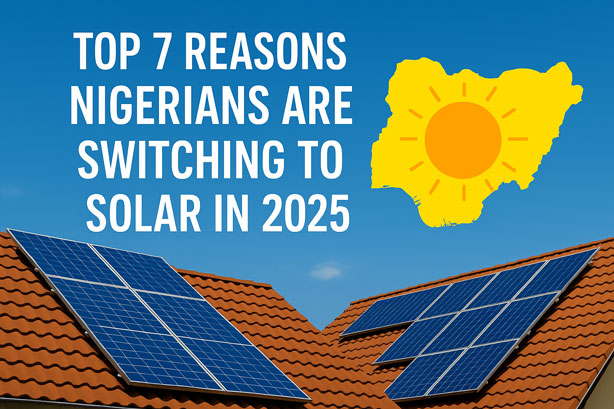In 2025, more Nigerians than ever before are switching from unreliable grid electricity and noisy generators to clean, sustainable solar power. This trend isn’t just a passing fad; it’s a practical shift driven by necessity, economics, and a growing awareness of climate change. Below, we explore the top 7 reasons why Nigerians are making the switch to solar energy in 2025.
1. Unreliable Grid Power Supply
Nigeria’s national electricity grid is infamous for its instability. With frequent power outages, load shedding, and nationwide blackouts, relying on grid electricity is increasingly frustrating. In major cities like Lagos, Abuja, and Port Harcourt, many households receive less than 12 hours of power daily.
Solar energy systems offer a dependable alternative. With panels installed on rooftops and connected to an inverter system, you can generate and store your own electricity independent of the grid.
2. Rising Fuel and Generator Maintenance Costs
Generators have long been the go-to backup for Nigerians, but they come with significant costs. The removal of fuel subsidies in 2023 led to a spike in petrol and diesel prices. Generator maintenance costs—including oil changes, repairs, and part replacements—also add up quickly.
Solar systems, on the other hand, have no fuel requirements. Once installed, they generate electricity silently and without ongoing expenses, offering both convenience and savings.
Comparison chart of generator vs solar costs over 5 years.
3. Long-Term Cost Savings
The upfront investment in a solar power system may seem daunting, but it pays off. Over a 5 to 10-year period, the cumulative savings from reduced fuel consumption, lower utility bills, and zero maintenance costs can be significant.
For example, a household that spends ₦50,000 monthly on fuel can save over ₦3 million in 5 years by switching to solar.
See our full guide to affordable solar packages for homes in Nigeria.
4. Access to Flexible Payment Plans
Thanks to partnerships between solar providers, fintech firms, and banks, many Nigerians can now finance their systems through pay-as-you-go plans. With solar loans and payment schemes that spread costs over 12-36 months, clean energy is within reach for more income brackets.
SEO Tip: Include keywords like “solar financing Nigeria”, “pay-as-you-go solar”, “solar loan Nigeria”
5. Increased Climate Change Awareness
More Nigerians are seeing the effects of climate change firsthand—longer dry seasons, flooding, and rising heat levels. Switching to renewable energy is a way to reduce carbon emissions and contribute to a healthier planet.
Solar power systems produce no emissions and help reduce the environmental impact of diesel generators, which release carbon monoxide and particulate matter.
Graphic Idea: Infographic showing Nigeria’s CO2 emissions by energy source.
6. Advanced Solar Technology
The solar market has seen major improvements in 2025. Today’s panels have better efficiency rates (20-25%), and lithium-ion batteries store more energy with longer life spans. Smart solar systems can be controlled and monitored via smartphone apps, providing real-time data on power usage and savings.
Learn how to monitor your solar system using your phone.
7. Government and NGO Support
Government projects like the “Solar Naija” program, and foreign grants from the EU and World Bank, have made solar systems more affordable for schools, clinics, and rural homes. These programs subsidize system costs, offer training, and even provide job opportunities in solar installation and sales.
Whether it’s economic survival, environmental consciousness, or energy independence, solar power offers Nigerians a better way forward. By 2025, switching to solar isn’t just smart — it’s necessary.
➡️ Interested in going solar? Contact Boroj Integrated for a free assessment and quote.

